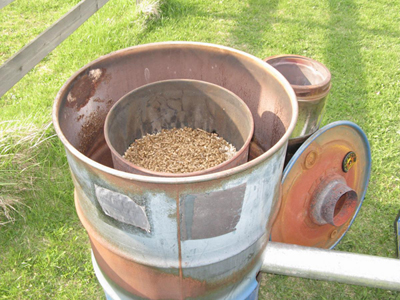Steam Weeder: Difference between revisions
m (inserted pic) |
mNo edit summary |
||
| Line 4: | Line 4: | ||
Traditionally, organic agriculture has relied on tillage or cover cropping for weed control. While these methods avoid the use herbicides, they have their drawbacks. Tillage can damage soil life and structure, resulting in a loss of valuable nutrients and organic matter. Cover crops may attract pests, delay ripening and compete with cash crops for nutrients and water. Flame weeders have been used with success, but often rely on propane gas from fossil sources. | Traditionally, organic agriculture has relied on tillage or cover cropping for weed control. While these methods avoid the use herbicides, they have their drawbacks. Tillage can damage soil life and structure, resulting in a loss of valuable nutrients and organic matter. Cover crops may attract pests, delay ripening and compete with cash crops for nutrients and water. Flame weeders have been used with success, but often rely on propane gas from fossil sources. | ||
Enter the pyrolysis-powered steam weeder. The concept discussed here is about weeding with boiling-hot [http://en.wikipedia.org/wiki/Superheated_steam superheated steam]. As fuel, it can use various kinds of dry biomass that is pyrolyzed, turning water into steam. Pelletized biomass such as wood pellets should work very well as a fuel. The saturated steam from boiling water runs through a copper coil which is externally heated in the pyrolysis unit, creating the superheated steam. [[Biochar]] is generated as a by-product, making the process carbon-negative. So far, this is only a concept, published here for the purpose of creating prior art and prevent patenting. No prototypes have been built. Different scales are possible, from a hand-drawn cart to a larger version as a tractor implement. | Enter the pyrolysis-powered steam weeder. The concept discussed here is about weeding with boiling-hot [http://en.wikipedia.org/wiki/Superheated_steam superheated steam]. As fuel, it can use various kinds of dry biomass that is pyrolyzed, turning water into steam. Pelletized biomass such as wood pellets should work very well as a fuel. The saturated steam from boiling water runs through a copper coil which is externally heated in the pyrolysis unit, creating the superheated steam. [[Biochar]] is generated as a by-product, making the process carbon-negative. So far, this is only a concept, published here for the purpose of creating prior art and to prevent patenting. No prototypes have been built. Different scales are possible, from a hand-drawn cart to a larger version as a tractor implement. | ||
==Components== | ==Components== | ||
Revision as of 17:40, 19 February 2011
Main > Food and Agriculture > Farm equipment

Traditionally, organic agriculture has relied on tillage or cover cropping for weed control. While these methods avoid the use herbicides, they have their drawbacks. Tillage can damage soil life and structure, resulting in a loss of valuable nutrients and organic matter. Cover crops may attract pests, delay ripening and compete with cash crops for nutrients and water. Flame weeders have been used with success, but often rely on propane gas from fossil sources.
Enter the pyrolysis-powered steam weeder. The concept discussed here is about weeding with boiling-hot superheated steam. As fuel, it can use various kinds of dry biomass that is pyrolyzed, turning water into steam. Pelletized biomass such as wood pellets should work very well as a fuel. The saturated steam from boiling water runs through a copper coil which is externally heated in the pyrolysis unit, creating the superheated steam. Biochar is generated as a by-product, making the process carbon-negative. So far, this is only a concept, published here for the purpose of creating prior art and to prevent patenting. No prototypes have been built. Different scales are possible, from a hand-drawn cart to a larger version as a tractor implement.
Components
- as the core heat-generating unit, a biomass gasifier (example: modified version of a top-lit-up-draft ("TLUD") gasifier)
- boiler for water
- copper coil
- small electric fan for air flow to the TLUD
- an Arduino that controls the fan, thereby controlling temperature in the TLUD
Uses
- (organic) weeding
- against invasive species
- possibly for soil sterilization
- biomass drying, even torrefaction - generating more fuel right where it's needed.